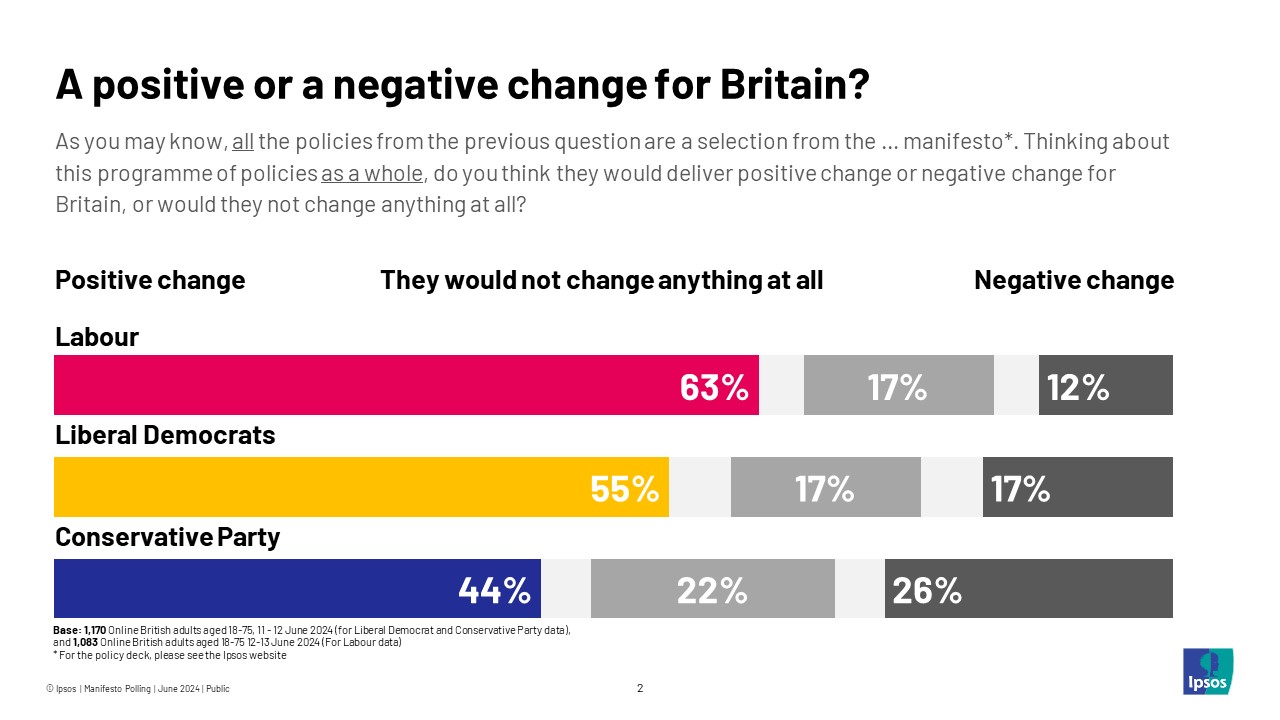6 in 10 Britons think Labour manifesto represents positive change for Britain
- Commitments on the NHS, teachers and policing most popular – as are commitment to road maintenances / fixing potholes.
- But half doubt Labour can fund commitments, with half or more of this group expecting tax rises / increased borrowing to ensure commitments are met.
- Less than half (44%) think Conservative plans represent positive change.
New polling from Ipsos has found that 6 in 10 (63%) of Britons believe that the policies in the Labour party manifesto would represent a positive change for Britain. This is followed by 55% for the Liberal Democrats, and 44% for the Conservatives.

However, there is some scepticism about the affordability of manifesto pledges. half (50%) of Britons are not confident that the policies contained in the Labour manifesto are affordable within the party’s tax and spending plans (37% are confident). This rises to 57% for the Liberal Democrats (23% confident), and 62% for the Conservatives (25% confident).
Those not confident in the affordability of party manifestos were asked how they expected the parties to respond:
- 56% of those not confident in Labour think they will raise borrowing to fund commitments, 53% think they will raise taxes and 55% think they will not deliver on all their plans.
- For those lacking confidence in the Conservatives. 67% think they will not deliver all their manifesto commitments, 52% expect them to cut public spending.
Elsewhere in the poll, support for key policies within each manifesto were polled:
Labour manifesto
- The most popular policy in the Labour manifesto is the party’s pledge to deliver an extra 40,000 NHS appointments every week (83% support).
- This is followed by investing £65 million per year to fix up to 1 million potholes (76% support) and recruiting 6,500 new teachers in subjects experiencing shortages (74%).
- 7 in 10 (70%) support recruiting 13,000 new neighbourhood police and community Police Community Support Officers.
- The least popular proposal in the Labour manifesto is lowering the voting age for UK General Elections to 16 (29% support, 48% oppose).
- The party’s plans to renationalise the railways and establish a publicly owned clean power energy company called GB energy each receive 60% support.
Liberal Democrat manifesto
- 87% of Britons support the Liberal Democrat’s pledge to guarantee all patients can start treatment for cancer within 62 days of an urgent referral. This is the highest level of support for any policy across the three manifestos polled.
- This is closely followed by recruiting 8,000 more GPs to give everyone a right to see a GP within 7 days (or 24 hours if urgent), which has 86% support.
- Lowering the voting age from 18 to 16 also comes at the bottom of the ranking of the Liberal Democrat manifesto (29% support, 49% oppose).
- The public is divided on the party’s pledge to rejoin the European Single Market (51% support, 30% opposed).
Conservative manifesto
- The most popular policies in the Conservative manifesto are the party’s pledges to increase NHS spending above the level of inflation every year and build 100 new GP surgeries in England (each with 74% support).
- This is followed closely by recruiting 8,000 additional police officers each year (73% support).
- 5 in 10 Britons support the party’s promise to introduce a binding legal cap on migration.
- The party’s plan to introduce mandatory national service for 18-year-olds is the least popular policy in its manifesto (32% support, 45% opposed).
Commenting on the findings, Keiran Pedley, UK Director of Politics at Ipsos, said:
Looking at the various party manifestos it is clear that proposals around improving public services tend to poll best, though the public also tend to be sceptical that any party can deliver all they have promised within existing spending plans. Labour will be encouraged that their manifesto is seen as offering the most positive change as an overall package and will look to build on that relative goodwill -compared to others – as polling day approaches.
Technical note
- For the Liberal Democrat and Conservative manifestos, Ipsos interviewed a representative sample of 1,170 adults aged 18-75 across Great Britain. Polling was conducted online on between 11-12 June 2024.
- For the Labour manifesto, Ipsos interviewed a representative sample of 1,083 adults aged 18-75 across Great Britain. Polling was conducted online between 12-13 June 2024.
- Data are weighted to match the profile of the population. All polls are subject to a wide range of potential sources of error.






